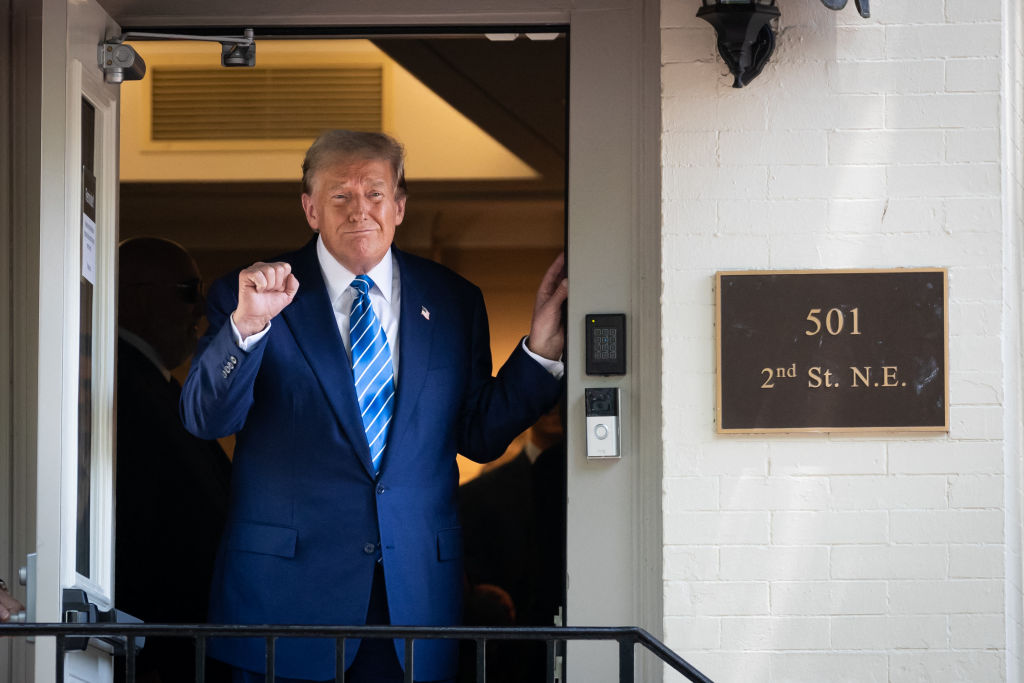Welcome to Thunderdome. Donald Trump took to Washington today in a series of meetings with business leaders, House members and senators in what was clearly meant to be a rousing “yes I’m still in charge” play. But it was also a Trump who seemed nervous about his prospects, particularly as it relates to how the abortion issue will be a drag on him in November:
Abortion has emerged as Democrats’ most potent political weapon in the two years since Roe v. Wade was overturned, a reality the former president acknowledged during a closed-door Capitol Hill meeting.
In addition to asserting that GOP lawmakers and candidates need to talk about abortion “correctly,” Trump argued the issue should be left to the states and stressed support for exceptions, according to multiple members in attendance.
The former president told his congressional allies that abortion has “cost” the GOP politically, but that it is “too important to ignore.”
He argued that Democrats are the “radicals” on the issue and “support abortion so far along that nobody supports that,” calling Republicans the “party of common sense.”
Trump’s position is largely in-line with where the Republican establishment and campaign apparatus are — urging Republicans to stress state-level solutions that include reasonable exceptions.
The intrigue: while Trump was speaking to lawmakers, the Supreme Court threw out its biggest abortion-related case since overturning Roe, saying that doctors opposed to a commonly used abortion pill, mifepristone, lacked legal standing.
Use of the drug has increased since Roe was overturned, and Thursdays high court action further complicates GOP efforts to restrict abortion access.
Representative Mike Kelly, a vocal advocate for strict abortion restrictions, said the former president’s comments signaled that a second Trump administration wouldn’t pursue federal limits on access.
“I think it will be as simple as exactly what it should be from the beginning: fifty states have the ability to make a decision, why turn it over to the federal government?” Kelly said.
“With the [Senate] filibuster, we’re not going to get any strong pro-life or pro-abortion policies passed. So the reality is: it is going to be at the state level,” said Representative Don Bacon.
The insistence among evangelicals is that Trump name a clearly pro-life running mate, as opposed to his commitments in 2016 which were all about the court. Democrats have tried to pin Republicans down with numerous show votes on the topic in the past several months, including today on IVF. But there’s little proof any of these show votes are actually working. Instead, they may be an indication of how little the Democrats have to run on in 2024.
The stalking-horse presidential candidate
Joe Biden isn’t really running for president, argues Charles C.W. Cooke.
I do not offer this observation in a conspiratorial tone. Joe Biden won the 2020 election legitimately; he is currently serving as the rightful occupant of his office; and he remains eligible to run again, to win again, to take office again, and to exercise all the levers of power that the Constitution would grant his office during a second term. Instead, I mean that Biden is operating as a stand-in, a widget or a MacGuffin, whose primary purpose is to make it to November 5 of this year without expiring. Most candidates have plans for their coveted four years; Biden has none. He does not expect to be there, and the public agrees with his hunch.
This, if I may borrow a phrase from the Trump years, is “not normal.” Per recent polling, 62 percent of voters think that, if Biden is reelected, he will die in office. Never, in the modern era, have voters been asked to cast a ballot for a candidate who they believed was unlikely to see the end of his term. In 2008, 20 percent of Americans thought that John McCain was too old. In 1996, 27 percent of Americans thought that Bob Dole was too old. In 2024, a whopping 86 percent of Americans believe that Biden is too old to be president of the United States. In effect, Biden’s candidacy represents a sort of reverse Keynesianism, built atop the flippant promise that, in the short run, he’ll be dead. And they say that our politics has lost its ambition!
That Joe Biden has been transmuted into little more than a game token is routinely implied by the substance of our political conversations. Inevitably, discussions of Donald Trump’s candidacy revolve around what will happen if Donald Trump wins the presidency, and, inevitably, discussions of Joe Biden’s candidacy revolve around what will happen if… Donald Trump wins the presidency. Filter out the partisan hallucinations in which Biden is cast as a successful chief executive, and you will find little more than anti-matter left within the residue: Biden must win, because Donald Trump must not, and, because Biden must win, then Biden cannot be too old or too incompetent or too misguided, because if Biden is too old or too incompetent or too misguided, then Donald Trump might win, and, as was established earlier, Donald Trump must not win. This, perhaps, is why Biden so often likes to say, “Don’t compare me to the Almighty, compare me to the alternative.” The alternative is all he’s got — and, at his age, irritating the Almighty is a risky idea, indeed.
The fruits of this approach have been extremely peculiar. If political correctness is defined as the repetition of mantras that everybody knows to be untrue, the Democrats’ 2024 pitch might be defined as the elevation of “ought” over “is” alongside the berating and exiling of anyone who declines to play their proper role within the charade. Yesterday, Biden’s approval rating dropped to a record-low 37 percent in the 538 average of polls, and, instead of absorbing this information as if it were part of the fabric of our shared reality, the political establishment elected to lash out at the messengers. In and of itself, this is odd. But what makes the whole thing so utterly, startlingly, unfathomably weird is that the people who were responsible for this outburst are the very same people who will immediately begin orchestrating Biden’s removal if he manages to win in November after all.
Will voters care about Hunter’s verdict?
How much will Hunter’s verdict matter?
Hunter Biden’s conviction Tuesday on three felony offenses represents another dark moment for a family that has endured a series of tragedies and comes after a trial that laid bare the strain his addiction put on the president and relatives who have rallied around him.
The unprecedented felony conviction of a sitting president’s son raises the possibility that Hunter Biden will face some prison time, and leaves him with a criminal record going into a separate tax-evasion trial that is currently set for September. His sentencing could occur in October, just weeks before President Biden’s expected rematch with Republican Donald Trump — who made history with his own felony conviction last month.
The political impact of the conviction is muddled: the president and his allies have made a point recently of branding Trump a “convicted felon,” a label his son now also carries. Trump and his fellow Republicans have criticized Hunter Biden over his business dealings but have mostly avoided doing so over the gun case, and there is little sign in polling that voters paid attention to the proceedings in Delaware.
On the flip side, it does matter to the extent that it removes a point of attack from the Biden arsenal. They’d like to make Donald Trump out to be uniquely unqualified… but now they can’t.
Don Jr., kingmaker?
Apparently that’s the role he’d like to have:
For now, he’s a gatekeeper for the party his seventy-seven-year-old father has remade in his own image. Trump Jr. is like his father in some ways: he enjoys trash-talking on social media and campaigning, but isn’t as attracted to the day job of governing that would come with running for and winning public office.
With his father’s backing, he’s become adept at working the internal politics of the Republican Party.
He elevates his friends (including Vance and Indiana Representative Jim Banks). “With the exception of his dad, I’m not sure I’ve seen anyone who has a stronger natural connection to our base,” Vance said.
Trump Jr. has developed a multi-platform messaging network to build his brand. His Triggered podcast on Rumble is popular with MAGA enthusiasts and likely will expand beyond its current twice-a-week schedule, a person familiar with his social media strategy told Axios.
One more thing
Are the names on Donald Trump’s veep list really the final roster of his consideration? There are some notable names missing if so. But there are also some names that people consider just included out of respect. Does anyone really think Trump is going to pick Ben Carson? That said, the list includes three people at least who have very clear ambitions toward higher office — Rubio, Cotton and Vance. Does Trump want someone who’s running right away? We’ll know soon enough — though we won’t know if Kamala Harris will debate any of them.


























Leave a Reply